Night Moves & Funny Dudes: Matt Braunger at the Ann Arbor Comedy Showcase

This interview originally ran on March 9, 2017. Braunger returns to the Ann Arbor Comedy Club from March 12-14, 2020.
Portland-raised, Los Angeles-based stand-up comedian Matt Braunger has been a regular fixture in comedy clubs and on late night talk shows for over 10 years with his brand of introspective observational comedy. Braunger, 42, will be getting married later this year for the first time and is currently working on new material for a new hour-long special during his Enraged to be Married tour that hits Ann Arbor this week.
In the late 1990s, fresh out of college, Braunger moved to Chicago where he worked with improvisational guru Del Close, and along with comedians like Hannibal Buress and Kyle Kinane helped create an alternative comedy scene in a city that didn’t have one. Finally deciding on stand-up instead of improv, Braunger moved to Los Angeles to further his career, eventually landing a spot on the final season of MADtv in 2009.
Since the end of MADtv, Braunger has been a regular on the NBC comedy Up All Night, had a recurring role in the second season of Agent Carter on ABC, and most recently appeared on Cameron Esposito and Rhea Butcher’s Seeso comedy Take My Wife. Along with his acting appearances, Braunger has also released three comedy albums and appeared as Bruce Springsteen in the Channel 101 series Yacht Rock.
Braunger will appear Thursday, March 9 through Saturday, March 11 March 12-14, 2020, at the Ann Arbor Comedy Showcase, and we talked to him about Midwestern comedy scenes, his upcoming special, politics, his podcast, a new Amazon Prime series, and Bob Seger.
Tanya Shaffer and Vienna Teng's musical "The Fourth Messenger" offers a contemporary view of the Buddha
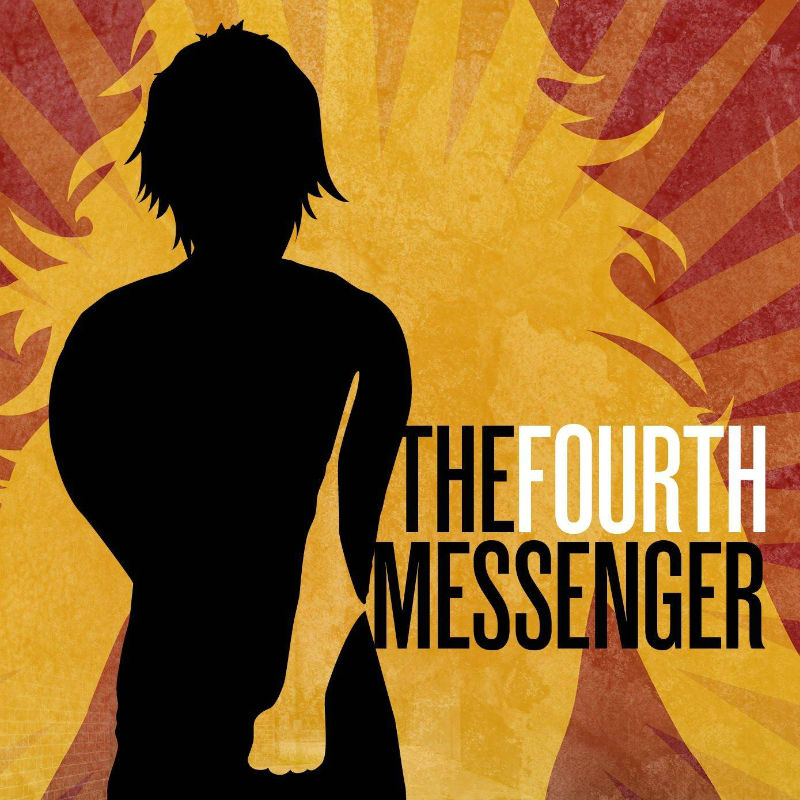
Meditation is meant to focus the mind by clearing away random thoughts. But sometimes meditation may inspire a radical new idea.
Playwright Tanya Shaffer had such an inspiration that led to the creation of The Fourth Messenger, an unusual musical about the Buddha that will be given a concert staging at The Ark on March 14 as a fundraiser for the venue's Spotlight Series.
“The idea came to me on a nine-day silent retreat when I was supposed to be clearing my mind,” she said. “I was thinking about the story of Buddha’s enlightenment, where he sat under a tree and vowed not to get up until he found enlightenment. Then for many days and nights, all the temptations of the world are trying to get him up. And it came to me that would be cool as a song and dance, the temptations standing under a tree and then thinking the whole story would be a musical because it has that scale of a hero’s quest and so I got excited on the retreat and for many hours forgot about my breath and I thought about the musical.”
Neighborhood Theatre Group’s new play "Thoughts and Prayers" explores what happens when a high school is upended by violence
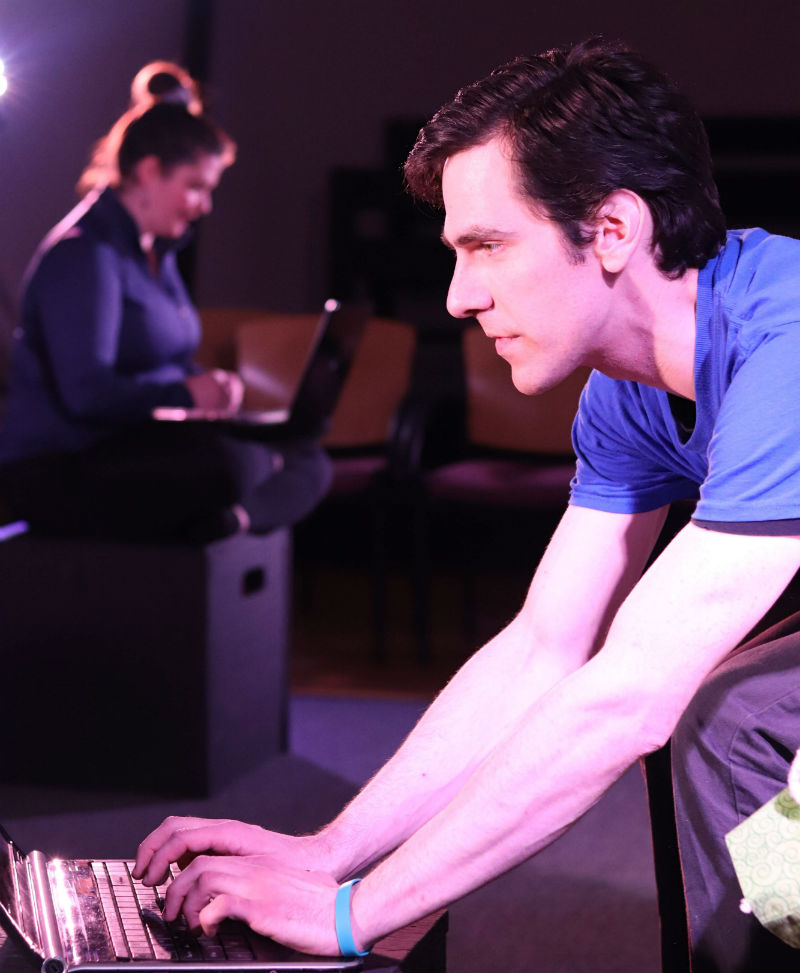
Neighborhood Theatre Group’s new play, Thoughts and Prayers -- written by A.M. Dean and directed by Marisa Dluge -- is a story based in fictional but present-day Michigan where a gun and manifesto were discovered in a high school student’s trumpet case. The FBI responds by sending in Agent Sarah Allistair to implement “Project Armored Apple” in which teachers are supplied guns and training to react in the event of an attack at the school.
The story centers on Agent Allistair and Andy Webber, the awkward and ominous 17-year-old friend of Tyler, the gun-and-manifesto student. Andy’s family comprises of his mother, Melanie -- the devoted but anxious parent who is also a teacher at his high school; his father, Doug -- the cringe-inducing dad who thinks Tyler’s motive is related to receiving “too many hugs”; and Uncle Jeff -- a janitor at the high school and the relatable adult the teenager desperately needs.
There's a violent interaction in the play, but writing about it directly would be a spoiler. Trust that it comes as a surprise.
Thoughts and Prayers is directed by Marisa Dluge and stars Mimi Blackford, Eric Hohnke, Mike Sandusky, Debbie Secord, Kate Umstatter, and Craig VanKempen.
The term “thoughts and prayers” has become a common colloquialism within the discussion of school shootings. Playwright A.M. Dean uses this story to explore our reactions to these tragedies, how these tragedies may affect the afterlife, and how we prevail through our thoughts and prayers.
As to be expected, this play did not provide answers as to why these senseless acts take place in our schools. It left me feeling more nauseous about the current state of violence in our schools, more so than anything else. Perhaps that is a good thing.
Dean is the literary manager and co-founder of Neighborhood Theatre Group. He lives in Ypsilanti and received his degree from Michigan State University where he studied theater.
He answered a few questions via email.
The Real Reality: PTD Productions explores Tom Stoppard’s multilayered “The Real Inspector Hound”
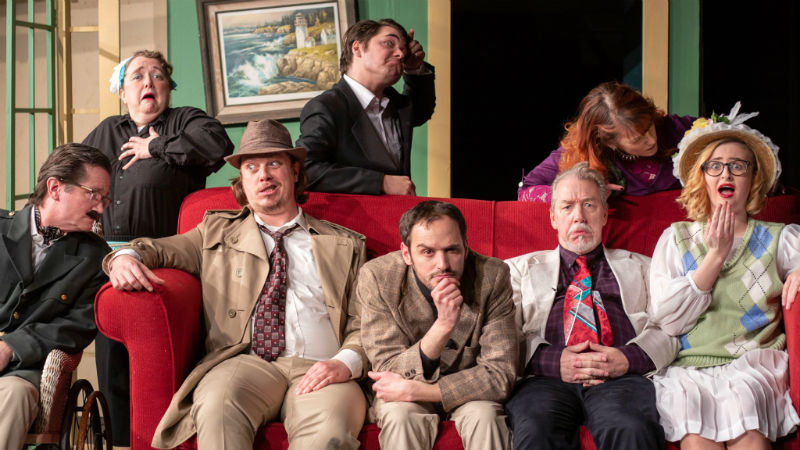
Tom Stoppard’s The Real Inspector Hound puts a theater reviewer in the interesting position of reviewing a play that satirizes theater reviewers reviewing a play. It is an absurdist work that is, on the surface, like a play-within-a-play, but it becomes something more. It’s a journey that explores identity, authenticity, and what is real versus what we tell ourselves might be real. PTD Productions performs this layered classic with aplomb.
The audience is first introduced to characters Moon (Russ Schwartz) and Birdboot (Larry Rusinsky), two theater critics attending a new murder-mystery play in London in the style of Agatha Christie’s The Mousetrap. (The title is also a reference to Christie’s famous play.) Moon is a second-string theater critic with an obsessive fixation on first-string theater critic Biggs. Throughout his monologues, Moon begins to define his existence with Biggs’s absence and ponders killing Biggs in order to take his place. We eventually learn, however, that there is a third-string critic Puckeridge behind Moon, and Moon wonders if Puckeridge yearns for Moon’s death as Moon dreams of Biggs’.
Michigan-based theater artists create "The Call of the Void," a sci-fi audio drama set in New Orleans
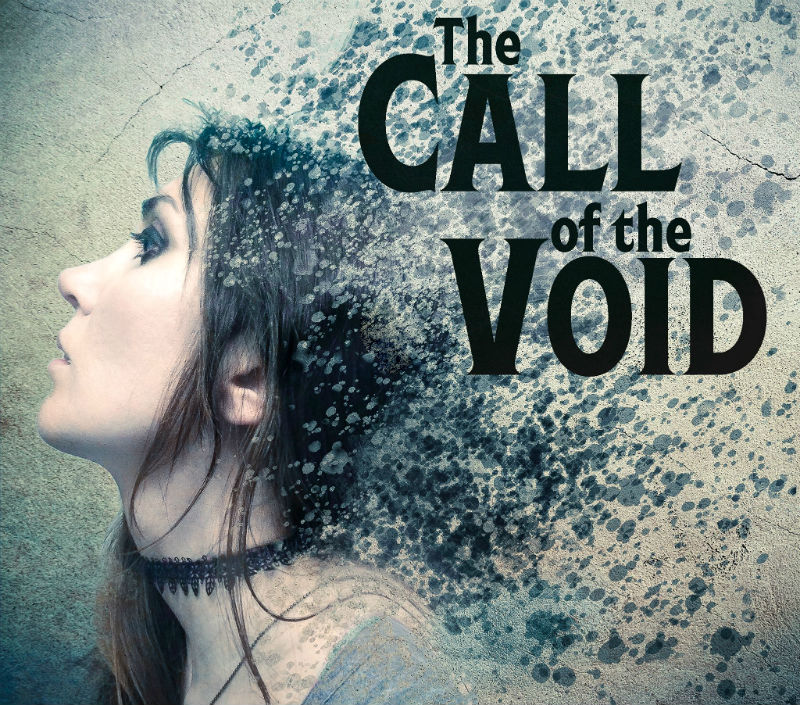
The Call of the Void is a sci-fi audio drama following Topher and Etsy as they look for the truth behind a mysterious illness taking hold of victims in modern-day New Orleans. The audio drama has 10,000 listens in 54 different countries on 14 different streaming platforms -- and it was all created in a living room in Pinckney, Michigan.
Creators, lead voice actors, and engaged couple Josie Eli Lapczynski and Michael Herman are theater artists who are using podcast technology to share their talents with a global audience through a nine-part series podcast audio drama.
While immersing themselves in sci-fi culture by reading HP Lovecraft, binging shows like Stranger Things and listening to the podcast Rabbits, Lapczynski and Herman decided to make their own sci-fi audio drama.
“We wanted to make a television show for your ears,” said Lapczynski. “In the last year, we've also been getting more and more into cosmic horror. We knew we wanted to create something in this genre and this seemed like the perfect opportunity, but rather than write about Cthulhu, we wanted to make our own monster, and so The Call of the Void was born."
Encore Theatre's junior production of "James and the Giant Peach" finds a way to make everything better
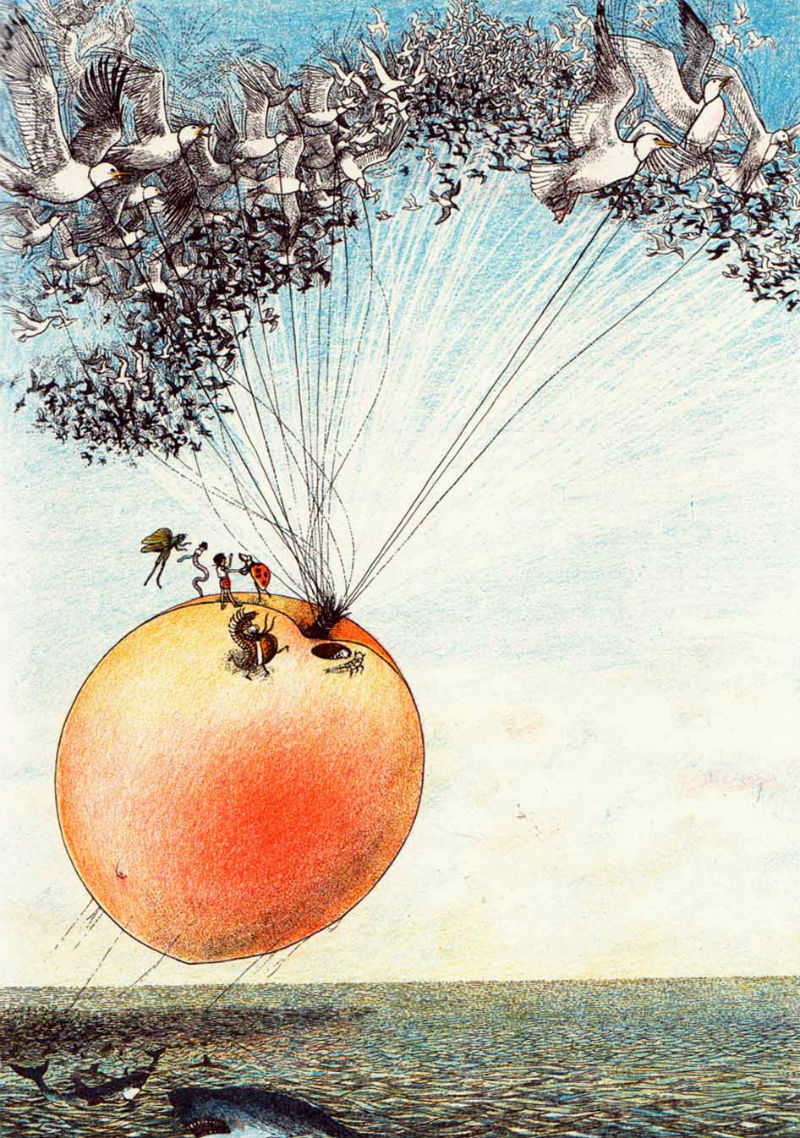
Perhaps it’s a sign of how trippy a moment we find ourselves in that the work of Roald Dahl seems suddenly, particularly ubiquitous.
For just as a touring production of Roald Dahl’s Charlie and the Chocolate Factory continues its run at Detroit’s Fisher Theater, regional productions of the James and the Giant Peach stage musical -- with a book by Timothy Allen McDonald, and music and lyrics by U-M grads and Oscar, Tony, and Grammy Award winners Benj Pasek and Justin Paul -- have been sprouting up everywhere, including at Dexter’s Encore Theatre.
Encore’s junior production, which begins February 28 and runs for eight performances through March 8, features 22 young performers, ranging in age from eight to 18.
“One of the things I love about [the show] is, not just the chosen family aspect of it, but also, James has this ability to be dealt a terrible hand constantly, and yet he always finds a way to make it better, and always finds the good in things that other are quick to overlook and discard,” said Matthew Brennan, the director of Encore’s production. “The insects, for example, these pests people just want out of their house. … [H]e finds potential in them, and that speaks to something really cool about this story.”
Wordplay and funny fisticuffs highlight "Jeeves Intervenes" at Ann Arbor Civic Theatre
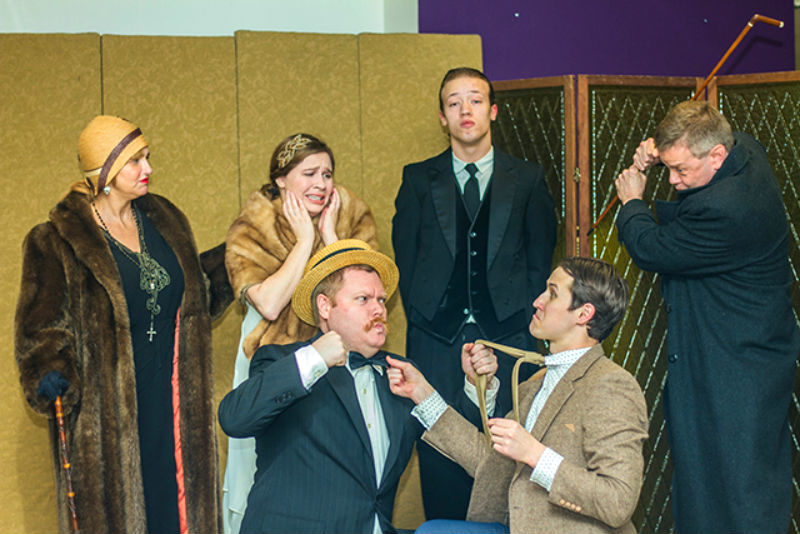
Monty Python didn’t invent the upper-class Brit twit. That honor goes to P.G. Wodehouse with his man-about-town Bertie Wooster.
Wodehouse was a humorist, novelist, short-story writer, Broadway lyricist (teaming with composer Jerome Kern), and man about town in the 1920s when he created Bertie. But he didn’t leave his inept creation without support, because he also created a witty man’s man, the very epitome of the valet, Reginald Jeeves, but always called just Jeeves.
Ann Arbor Civic Theatre will take audiences back to Wodehouse’s fanciful, upper crusty London of the 1920s when it presents Margaret Raether’s stage adaptation of Wodehouse in Jeeves Intervenes, March 12-15 at the Arthur Miller Theatre on the University of Michigan North Campus.
Director Andy Jentzen said it was Wodehouse’s playful use of language and a BBC series that got him interested in Jeeves and Wooster.
Dorrance Dance brings musicality to the rhythms of life in tap

I grew up studying and loving ballet and modern dance, but I always felt a little “meh” about tap. But after I watched MacArthur “Genius” award winner Michelle Dorrance perform with New York City Ballet dancer Tiler Peck in the Hulu documentary Ballet Now, I realized how wrong I’d been.
Dorrance brings her tap dance company Dorrance Dance to Ann Arbor on February 21-22 -- and trust me, you should be there. Her company’s style calls back to early black American tap dance and also pushes the art form forward effortlessly. Dorrance Dance will perform three works in Ann Arbor: Jungle Blues, a jazz-age inspired piece; Myelination, the titular ensemble piece; and Three To One, a more experimental work featuring only one dancer in tap shoes.
Theatrical Poetry: Director Malcolm Tulip discusses his U-M production of Federico García Lorca's "Yerma"
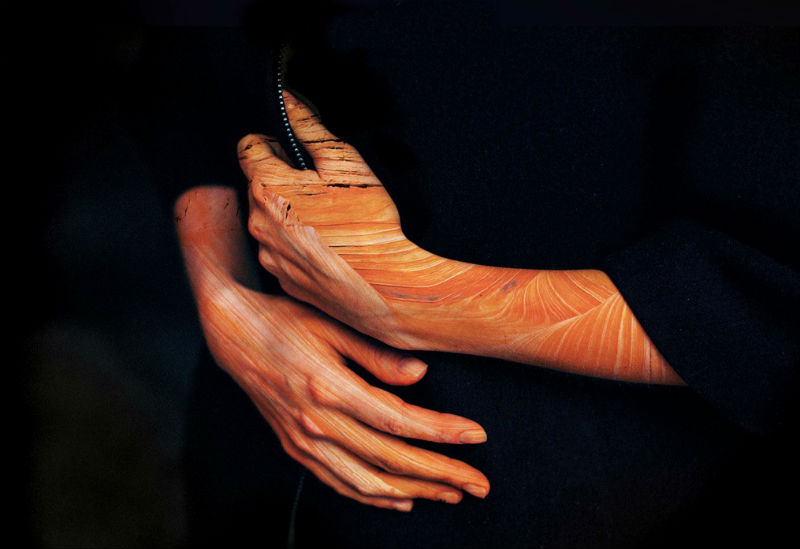
“Theater is poetry that gets up from the page and makes itself human. And when it does that, it talks and shouts, cries and despairs.”
The plot of Yerma -- a story about a woman’s struggles with societal pressures to conceive -- isn’t what makes Lorca’s 1934 tragedy a must-see classic.
What gives it power are the songs, dance, heightened gesture, and visual elements -- the poetry. “Lorca called Yerma ‘a tragic poem in six paintings,’” notes Malcolm Tulip, director of the University of Michigan production running February 20-23 at the Lydia Mendelssohn Theatre.
“Most people assume Yerma is the name of the protagonist, a woman who hasn’t been able to have a child," Tulip says, but the word means “barren” in Spanish and perhaps it isn’t a name at all. Perhaps it “describes this woman’s inner and outer worlds. Yerma here might be a naming of the woman's reluctance or inability to accept the seed of a man who she married out of duty. ... The landscape, like her womb, is uninhabited, possibly uninhabitable."
For the 'Gram: Lee Minora’s “White Feminist” plays with doing-good-to-look-good activism

For one hour on Tuesday, my fellow theater-goers and I in the video studio of U-M's Duderstadt Center were transformed into the live studio audience for a fictional television morning talk show called Becky’s Time. Our host, Becky, portrayed by Lee Minora, was a blonde-haired, French-manicured, self-proclaimed feminist, ready to use her voice to fight for herself and for us -- whether we wanted her to or not.
White Feminist takes to task the white women who suddenly became “woke” after the 2016 presidential election, eager to jump in, take charge, and change the world, all while failing to realize that not only were people already doing that work, but they have been for decades. That day’s episode was devoted to “Ladies' Time” (or was it “Lady’s Time”?), yet there were no guests.


































